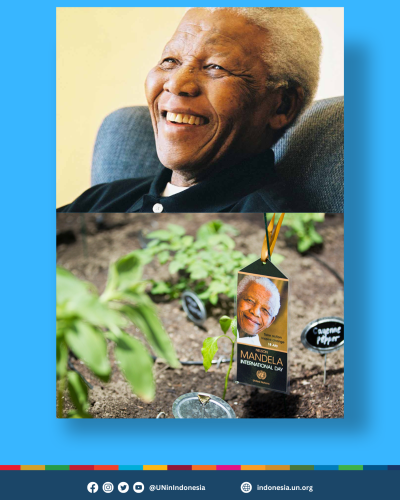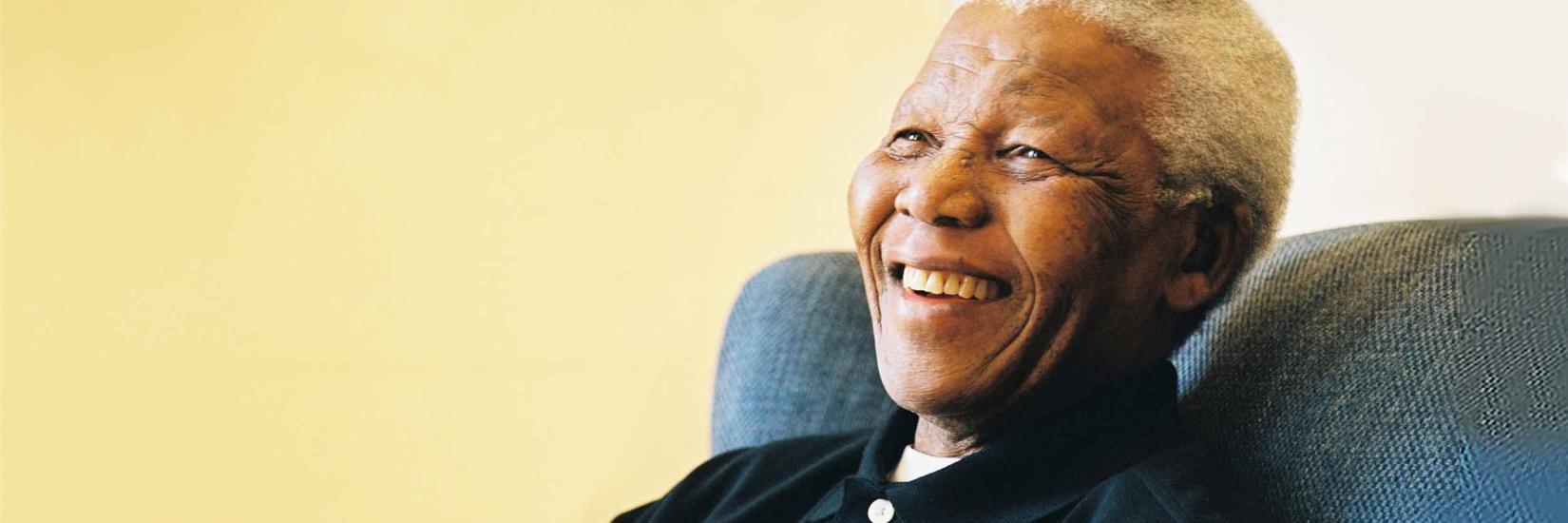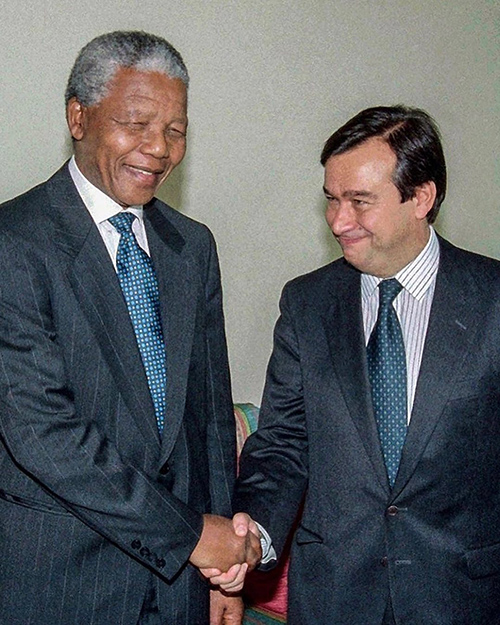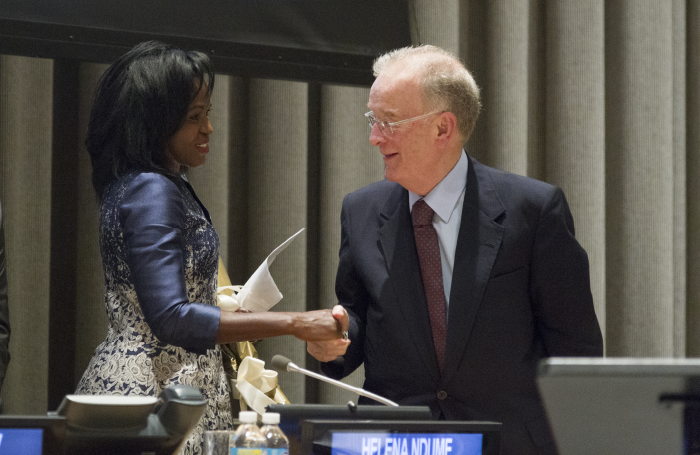Nelson Mandela International Day - 18 July


It is easy to break down and destroy. The heroes are those who make peace and build.
- Nelson Mandela.
What is Mandela Day?
On 18 July every year, we invite you to mark Nelson Mandela International Day by making a difference in your communities. Everyone has the ability and the responsibility to change the world for the better! Mandela Day is an occasion for all to take action and inspire change.
67 years in service of humanity
Nelson Mandela devoted his life to the service of humanity — as a human rights lawyer, a prisoner of conscience, an international peacemaker and the first democratically elected president of a free South Africa.
How did the day come about?
November 2009 - in recognition of the former South African President’s contribution to the culture of peace and freedom, UN General Assembly declares 18 July "Nelson Mandela International Day". Resolution A/RES/64/13 recognizes Mandela’s values and his dedication to the service of humanity in: conflict resolution; race relations; promotion and protection of human rights; reconciliation; gender equality and the rights of children and other vulnerable groups; the fight against poverty; the promotion of social justice. The resolution acknowledges his contribution to the struggle for democracy internationally and the promotion of a culture of peace throughout the world.
This part of the article has been published in the United Nations' site in this link: https://www.un.org/en/events/mandeladay/.
We celebrate Nelson Mandela International Day every year to shine light on the legacy of a man who changed the 20th century and helped shape the 21st. This is a moment for all to renew with the values that inspired Nelson Mandela. Absolute determination. A deep commitment to justice, human rights and fundamental freedoms. A profound belief in the equality and dignity of every woman and man. A relentless engagement for dialogue and solidarity across all lines and divisions. Nelson Mandela was a great statesman, a fierce advocate for equality, the founding father of peace in South Africa.
In times of turbulence, Nelson Mandela shows us the power of resisting oppression, of justice over inequality, of dignity over humiliation, of forgiveness over hatred. As the world takes forward the 2030 Agenda for Sustainable Development and strives to overcome new sources of adversity, let us recall the lessons of Nelson Mandela’s life, and the essential humanism that guided him: “For to be free is not merely to cast off one's chains, but to live in a way that respects and enhances the freedom of others.”
"I have cherished the ideal of a democratic and free society in which all persons live together in harmony and with equal opportunities. It is an ideal which I hope to live for and to achieve. But if needs be, it is an ideal for which I am prepared to die".
Nelson Mandela and UNESCO
A UNESCO Goodwill Ambassador and 1991 Laureate of the Houphouët-Boigny Peace Prize, Nelson Mandela’s legacy resonates with the mission of UNESCO, to empower all women and men on the basis of their equal rights and dignity, to promote dialogue and solidarity for justice and lasting peace. This action, this spirit has never been so important.
"His mission as an anti-apartheid revolutionary was establishing equality and freedom for all women, men and children. He stood for the fundamental rights of all human beings, regardless of gender, nationality or race. This is also the very ideal for which Nelson Mandela was jailed for 27 years. Despite his imprisonment, Nelson Mandela continued to believe in these ideals, and upon his release, continued to put them into practice."
This part of the article has been published in the United Nations' site in this link: https://www.unesco.org/en/days/nelson-mandela.
"Each of us can make a difference in promoting peace, human rights, sustainable development, and lives of dignity for all. Each of us can be inspired by Nelson Mandela's example. Let us all build on the legacy of Nelson Mandela." - United Nations Secretary-General António Guterres
Nelson Mandela embodied the highest values of the United Nations.
To honour his legacy on the promotion of social justice, the fight against poverty, and the promotion of a culture of peace throughout the world, the United Nations General Assembly in 2009 proclaimed Nelson Mandela's birthday, 18 July, as "Nelson Mandela International Day," devoting the day to public service. Individuals around the world are asked to mark Nelson Mandela International Day by making a difference in their communities.
Every day, the United Nations works for peace, human rights and sustainable development for everyone everywhere. Due to the powers vested in its Charter and its unique international character, the United Nations is exceptionally well placed to address issues confronting humanity in the 21st century, including disarmament, climate change, humanitarian crises, health emergencies, gender equality, and more.
Its success very much depends on passionate, principled, courageous and responsible leadership such as shown by Nelson Mandela.
As the UN marks its 75th anniversary in 2020, the world faces an unprecedented threat as the COVID-19 pandemic endangers everyone, everywhere. As always in times of crisis, the vulnerable suffer first and worst. It is more urgent than ever to reflect on the life and work of Nelson Mandela, who embodied the highest values of the United Nations.
In the face of these challenges, world leaders need to recognize the vital importance of unity and solidarity. Only together we can fend off the common threat and build back better with more sustainable, inclusive, gender-equal societies and economies around shared values, shared responsibility, shared sovereignty, shared progress.
Nelson Mandela reminded us: "As long as poverty, injustice and gross inequality persist in our world, none of us can truly rest."

Nelson Mandela and the United Nations Secretary-General António Guterres meet in Lisbon, Portugal, in October 1993. Photo: Carlos Marques/LUSA
Did you know?
On 24 September 2018, world leaders gathered at United Nations Headquarters in New York for the Nelson Mandela Peace Summit. At the Summit, nearly 100 Heads of State and Government, Ministers, Member States and representatives of civil society participants adopted a political declaration committed to redoubling efforts to build a just, peaceful, prosperous, inclusive and fair world, as they paid tribute to the late South African President’s celebrated qualities and service to humanity. Recognizing the period from 2019 to 2028 as the Nelson Mandela Decade of Peace, the Declaration saluted Mr. Mandela for his humility, forgiveness and compassion, acknowledging as well his contribution to the struggle for democracy and the promotion of a culture of peace throughout the world.
"The challenge posed by the next 50 years of the Universal Declaration of Human Rights, by the next century whose character it must help to fashion, consists in whether humanity, and especially those who will occupy positions of leadership, will have the courage to ensure that, at last, we build a human world consistent with the provisions of that historic Declaration and other human rights instruments that have been adopted since 1948." - Nelson Mandela on the 50th anniversary of the Universal Declaration of Human Rights (21 September 1998).
The promotion and protection of human rights is a key purpose and guiding principle of the United Nations. In 1948, the Universal Declaration of Human Rights laid out universal values and a common standard of achievement for all peoples and all nations. Today it is the most translated document in the world.
After 27 years in prison, Nelson Mandela was freed in 1990 and negotiated with State President F. W. de Klerk the end of apartheid in South Africa, bringing peace to a racially divided country and leading the fight for human rights around the world.
All human beings are born free and equal in dignity and rights. The rights to equality and non-discrimination are cornerstones of human rights law. Yet racism, xenophobia and intolerance are problems prevalent in all societies, and discriminatory practices are widespread. States are urged to take measures to combat racism, racial discrimination, xenophobia and related intolerance, and to promote tolerance, inclusion, unity and respect for diversity.
The elimination of South Africa’s system of legalized racial discrimination known as apartheid ("apart-ness" in the Afrikaans language of the descendants of the first Dutch settlers) was on the agenda of the United Nations from its inception. Over the decades, the world body contributed to the global struggle against apartheid by drawing world attention to the inhumanity of the system, legitimizing popular resistance, promoting anti-apartheid actions by governmental and non-governmental organizations, instituting an arms embargo, and supporting an oil embargo and boycotts of apartheid.
NELSON MANDELA PRIZE

The UN Nelson Rolihlahla Mandela Prize. Designed by the UN Graphic Design Unit. UN Photo/Rick Bajornas
The United Nations Nelson Rolihlahla Mandela Prize, established by General Assembly resolution 68/275 of 6 June 2014, is an honorary award presented once every five years as a tribute to the outstanding achievements of two individuals (one female and one male) from different geographic regions. The Prize recognizes the South African leader's contributions to democracy, justice and reconciliation and his dedication to the service of humanity.
The Prize is awarded for the second time in 2020, to Mrs. Marianna V. Vardinoyannis of Greece, philanthropist and world advocate for human rights and the protection of children's health and welfare. She is a Goodwill Ambassador of UNESCO since 1999, founder and president of "Marianna V. Vardinoyannis Foundation" and of "ELPIDA Friends' Association of Children with cancer". For more than 30 years, she has been fighting against childhood cancer and for a world without borders in health, helping thousands of children to be cured and Dr. Morissanda Kouyaté of Guinea, a leading advocate on ending violence against women and girls in Africa and Executive Director of the Inter-African Committee on Harmful Traditional Practices (IAC). He initiated efforts that resulted in an African regional instrument on ending violence against women. Dr. Kouyaté carried out exceptional efforts in the fight against harmful traditional practices, particularly the elimination of Female Genital Mutilation.

Helena Ndume of Namibia and Jorge Fernando Branco Sampaio of Portugal, the winners of the first United Nations Nelson Rolihlahla Mandela Prize, at the award ceremony on 24 July 2015. UN Photo/Rick Bajornas
It was awarded for the first time in 2015, to Dr. Helena Ndume of Namibia and H.E. Mr. Jorge Fernando Branco Sampaio of Portugal. Dr. Ndume is an ophthalmologist whose life's work has been the treatment of blindness and eye-related illnesses, both in Namibia and throughout the developing world. Mr. Branco Sampaio became a leader in the struggle for the restoration of democracy in Portugal and served as Deputy Minister for External Co-operation, as Mayor of Lisbon from 1989 to 1995, and as President of the Republic from 1996 to 2006.
THE NELSON MANDELA RULES
To honour the legacy of Nelson Mandela, who spent 27 years in prison in the course of his struggle for global human rights, equality, democracy and the promotion of a culture of peace, the United Nations General Assembly in resolution 70/175 of 17 December 2015 adopted a revised set of the "United Nations Standard Minimum Rules for the Treatment of Prisoners," to be known as "the Nelson Mandela Rules." The UN Office on Drugs and Crime (UNODC) serves as the custodian of these rules for the humane treatment of prisoners.
This part of the article has been published in the United Nations' site in this link: https://www.un.org/en/exhibits/page/building-legacy-nelson-mandela.




















